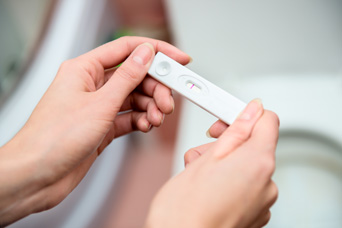7 Signs You Should Speak To Your OB About Infertility
 Fertility difficulties are real and unfortunately affect many couples. Around 10% of women have trouble getting pregnant or carrying to term. It is normal for it to take some time to conceive, but if it’s been over a year (six months if you are over 35) or any of these seven signs apply to you, it’s time to speak with your obstetrician about infertility. Don’t just wait and hope it will happen next cycle. There are many ways to get help conceiving.
Fertility difficulties are real and unfortunately affect many couples. Around 10% of women have trouble getting pregnant or carrying to term. It is normal for it to take some time to conceive, but if it’s been over a year (six months if you are over 35) or any of these seven signs apply to you, it’s time to speak with your obstetrician about infertility. Don’t just wait and hope it will happen next cycle. There are many ways to get help conceiving.
1. Are You Over 35?
When it comes to getting pregnant, age actually matters. If you are trying to get pregnant and are 35 or older, you should know that your odds of conceiving are reduced to 15-20% in a given month. As long as there are no other risk factors, many women successfully conceive and carry healthy babies to term. However, if you have been trying for more than 6 months, it’s time to speak with your OB about tracking your ovulation and potential fertility treatments available to you.
2. Is Your Partner Over 40?
Like women, male fertility also declines with age. However, male fertility is not as predictable. Generally, after the age of 40, sperm motility, morphology and seminal volume decreases. Due to this, the rates of miscarriage increase and even the success of in vitro fertilization decreases. There are many strategies and treatments an OB can recommend for both women and men, so don’t hesitate to consult with a specialist if you are struggling to conceive.
3. Do You Have a History of Missed Periods?
If you have a history of missed periods, or a total lack of periods (amenorrhea) and are struggling to conceive, it’s important to see your OB as soon as possible. Missed periods are a sign of disruption of a woman’s menstrual cycle and the health of this cycle is necessary for natural conception. Your OB can help you address menstrual challenges by finding and addressing the underlying causes, which in turn will help you conceive. In some cases, you may also need to seek fertility treatments.
4. Are You Diabetic?
Diabetes is often associated with an increased risk of infertility. Diabetes alters your blood sugar level which, in turn, alters the flow of your menstrual cycle and increases the risk of a miscarriage. Even with diabetes under control, fertility can be affected. If you have diabetes, it is important to consult with your OB before trying to conceive so that you can understand the options available to you to help manage your diabetes, get pregnant and carry a healthy baby to term.
5. Do You Suffer From Endometriosis?
Endometriosis is a condition in which the tissue that normally lines your uterus grows outside of your uterus, causing you a great deal of pain and discomfort. The tissue becomes trapped, which can be incredibly painful, particularly during your period and intercourse. Endometriosis is also associated with infertility.
The good news is that treatments are available which can help increase your chances of getting pregnant. An obstetrician can prescribe medication, or in extreme cases, perform surgery, in order to treat endometriosis and fertility treatments may be an option as well.
6. Do You Have PCOS?
PCOS, or Polycystic Ovarian Syndrome, occurs when the body produces excess androgens (male hormones), excess insulin or has low-grade inflammation. PCOS can be related to many uncomfortable symptoms, including weight gain and the growth of hair on the chin or chest. If you have PCOS, you're not alone. Estimates show that anywhere from 2-20% of women suffer from PCOS. Unfortunately, PCOS cannot be cured. However, with proper treatment, it can be managed.
If you know you have PCOS, you should be aware that it may cause infertility issues, particularly given that PCOS typically strikes women between the ages of 18-44, the child-bearing years. Women have found that the infertility caused by PCOS can be overcome with weight loss or medication.
7. Have You Had More Than Two Miscarriages?
Most women who have experienced a miscarriage can go on to have healthy, full-term pregnancies. However, multiple miscarriages is often a sign of underlying fertility issues that require medical attention. It is important to see your OB if you have had more than two miscarriages.
If you're having trouble conceiving or have one of the risk factors that may make it more difficult, make an appointment today. Call Kansas City ObGyn at 913-225-8567 or email us at This email address is being protected from spambots. You need JavaScript enabled to view it. and let us help you.






